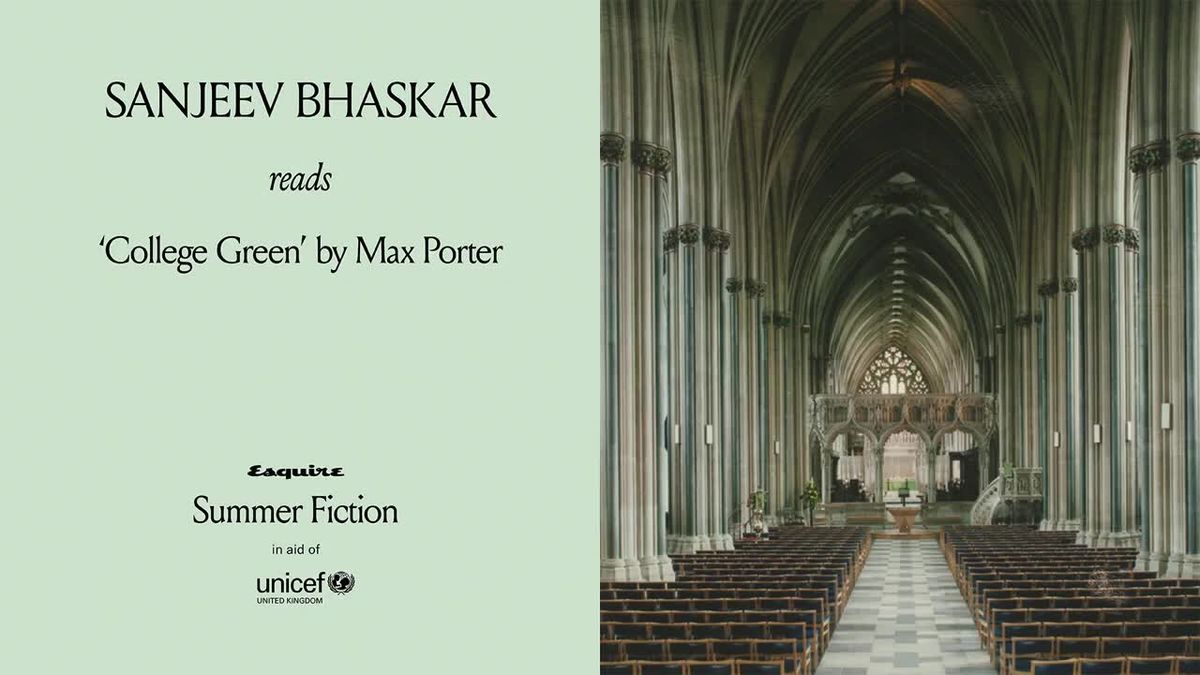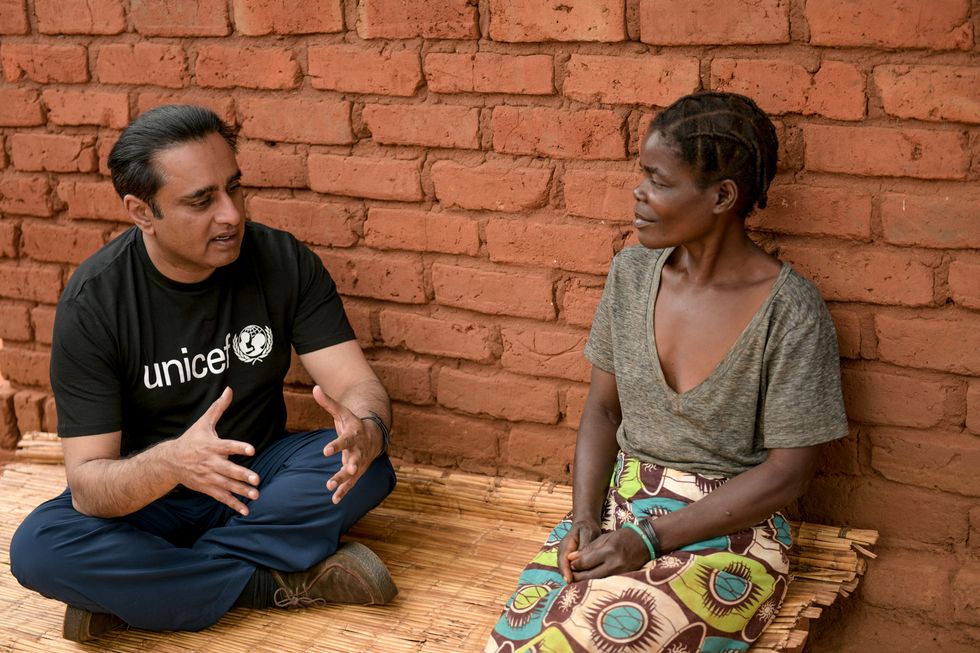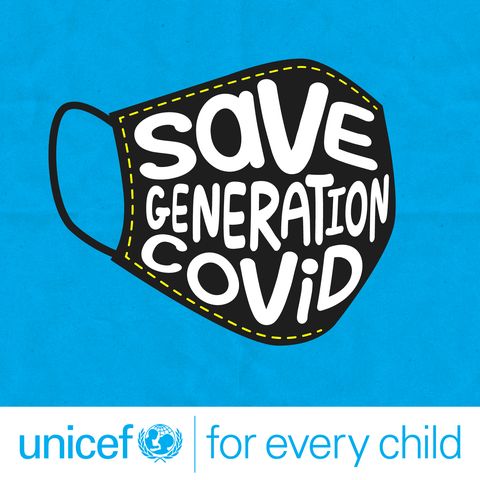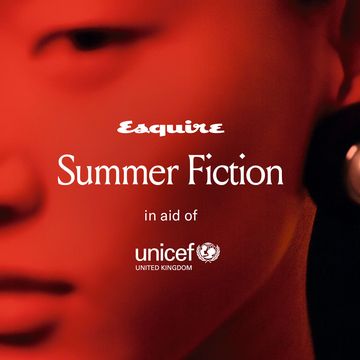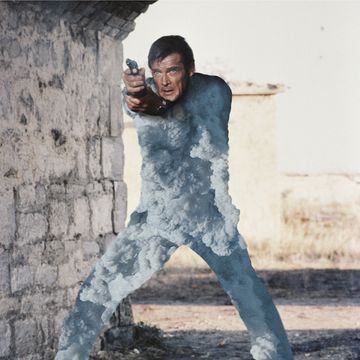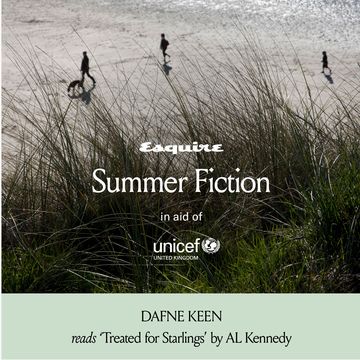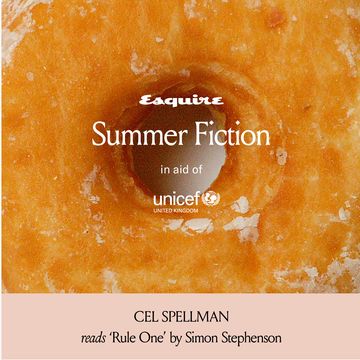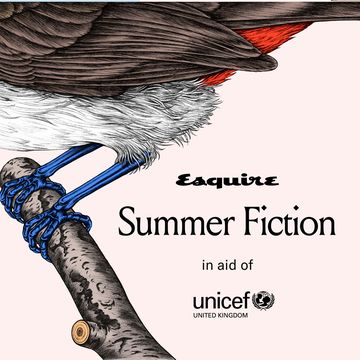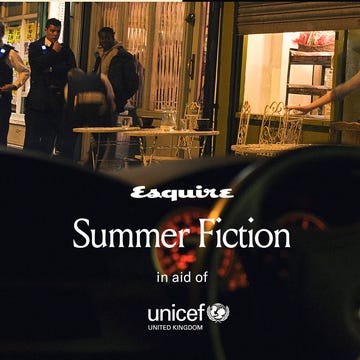Esquire's Summer Fiction series, in aid of Unicef UK, brings together some of the world's finest writers, and greatest actors, for a collection of original stories and readings that offer, we hope, a ray of light in these dark times, as well as the chance to raise funds for Unicef's Generation Covid campaign. (Read Unicef ambassador and Esquire editor-at-large Andrew O'Hagan's piece on why the campaign is so vital here).
Where a child is already experiencing hardship, outbreaks of diseases bring a new emergency to an already precarious situation. This is the story of Generation Covid. For vulnerable children all over the world, it poses the biggest threat since the Second World War. Please enjoy these stories, then visit Unicef UK's Generation Covid page to donate and hear a special message from Unicef UK High Profile Supporter Sanjeev Bhaskar.
DONATE NOW
Audio: read by Sanjeev Bhaskar
To listen, click 'Unmute' in the video at the top of this page. Alternatively, listen and download on SoundCloud, or listen on YouTube.
'College Green' by Max Porter
“Of the original Bristol station the N side is still in existence along a courtyard and, a more interesting survival, the train shed by Brunel. This has a wooden hammer beam roof of a span wider than Westminster Hall. The light comes in in a most unmedieval way by glazing along the ridge.”
I flicked through Pevsner’s North Somerset and Bristol on the train, anticipating the route I thought Ross and I might take through the city. Pevsner is such good company. And so too was the 20-year-old me, who had left ecstatic notes in the margins of the book. I had found Bristol cathedral “jaw-droppingly good”. I had scribbled “incredible vault / the liernes!”
I remember that day. Trying to take in the grand scheme of it all but bombarded by the detail, the foliage, the friezes and heads, the endless layered surprises. “The Elder Lady Chapel is a MIRACLE.” This was before I’d ever been to Wells, or Durham, or Ely. Young me had written in nice lettering on the title page “a building never stops. A building is always telling a thousand simultaneous stories.”
I don’t know if this was a quote, or me being awestruck. Pompous. I know my trip to Bristol cemented my obsession. I wanted to spend my life reading ecclesiastical buildings. Church Nerd, my wife calls me.
Ross had texted to say he would be under the information board. I felt oddly nervous. Friends from school aren’t like friends we’ve met as adults. We’ve seen the unformed in each other. We feel obliged to maintain contact but we don’t really know each other. I was almost ready to stop answering Ross’s occasional emails and let the friendship fade until he said he lived in Bristol and if I was ever down then the famous Saturday Mornings at College Green were “totally worth seeing”. I wanted to revisit the cathedral, and I did want to see what all the fuss was about on College Green, so I said I’d jump on a train.
I heard her name buzzing up and down the train carriage. Megan. And as I idly scrolled through my phone I saw that #megan was trending.
The moment before meeting someone tires me out. What will they be like? Did I ever know them? Will I say or do something stupid? Will we pass the time without awkwardness or incident? How have they aged? And then, somewhat tragically, Oh yes, that’s them.
Ross. A run-of-the-mill flesh construction. Everyman. Not as tall as I remembered. Ruddier. Barbershop neatness on the sideburns and necklines of his standard dad hairstyle. Collar turned up. Expensive sporty coat. An appearance that spoke clearly and truthfully of its constituent parts: rugby, recruitment consultancy, BMW washed regularly, ever-so-slightly-right-of-centre politics, middlest English, affluent, culturally unengaged beyond panto and Coldplay. Yes, that’s Ross. And yes, the original floorplan of the boy is still visible. Especially the grin, like a drawbridge, part welcome, part threat.
Yes mate, he said as I dodged out of the crowd towards him. Welcome!
This is how it is now, he said as we left the station, nodding at the river of wrapped bodies making their way patiently down the hill from Temple Meads, past the huge digital screen with the hashtag “#Megan” and the flashing arrow. Thousands. Every week, unless it’s raining. Mind you, Bristol is the capital city of sensible outdoor gear, so even when it’s raining it’s still heaving. People love it.
Well, that’s some fairly snazzy outdoor clothing you’ve got yourself, mate, I said. It felt clunky as I said it, the word “mate”. I don’t spend much time with men. Ross is an old friend and I doubt he would have noticed me using the word, let alone felt it was awkward, or unpractised.
I won’t lie, said Ross, this coat cost me a small fortune, but it’s breathable.
Breathable is good, I said, and wished I was alone.
As we shuffled along with small steps in the throng of people, down the taxi-clad incline and away from the station, I wondered if he replayed his comments in his head, as I do. Was he asking himself these questions, as I was?
He clapped me hard on the back. Anyway, fuck! It’s good to see you, man.
I grinned. I couldn’t clap him in return because my hands were in my pockets and he kept his arm on my back. I didn’t want our arms to become tangled if I reciprocated, better to keep separate, two distinct entities, so I just smiled and said, It really is. And again, with better uplift: It really is!
The crowd had stopped, waiting for the green man. God, this is all new, I said.
The never-ending redevelopment, said Ross. It’s changed a bit since you were here. Anyway, fuck! Tell me everything. Wife? Babies? Work?
Ah man, I said, where to start? And I felt foolish, saying that, because he had just provided me an easy structure for my reply. I wanted to answer quickly before he rephrased the question. I knew he would. I knew he would say something like, You’re still banging away at the buildings, is that right? So I wanted to get in quickly with the facts. Yes, a wife, yes, kids. Or I could be more honest and say, Oh Ross, can we not do the catch-up chat, I don’t want to pretend to be interested in you, or interesting to you, we just knew each other at school, we don’t owe each other knowledge or facts of our lives, can’t we just walk along in silence and get to College Green and see this thing, this spectacle, whatever it is, and go home?
But in the pause while I over-thought it, sure enough, Ross came back for more, and I realised how out of practice I was, chatting to a bloke. I had no ease, no intuition about flow, pace and rhythm. It was like bad tennis. Ross had good and well-taught groundstrokes.
Uncle Google tells me you’re properly a famous nerd now?
Ha ha, no, not really. I don’t think any architectural historians are famous.
Bullshit, man, I know for a fact you’re big in the architecture world.
Big in Japan.
Really?
No, I was joking — you know, the song? But actually, to be honest, I am actually quite big in Japan. I taught for a term in Japan last year.
Ah man, that’s crazy. Very cool. So, you can make a decent living writing about buildings?
That was quick, I thought. Honestly, I said. It’s not something a person does for the money.
Ross laughed and clapped me again on the back. I grinned and wished I was a long way away. Grin, grin, change the subject.
What about you? Tell me all! I didn’t want him to tell me anything, let alone all, but I wanted to walk along, not looking at him, not speaking, and the crowd was moving so slowly. It pained me not to be peeling off from the throng to spend an hour in St Mary Redcliffe. No matter, I thought, I’ve seen it before and I’ll see it again.
“Queen Elizabeth called St Mary Redcliffe ‘the fairest, goodliest, and most famous parish church in England’. Comparisons of fame are odious, but as far as aesthetic ambitions and aesthetic achievement go, St Mary need not fear comparison with any English parish church.”
Well, on your left is St Mary Redcliffe, which is where my second son sings in the choir. He is like worryingly into the whole thing. Saying his prayers before bed and all that. Worse habits, I suppose, but we are mildly alarmed. Don’t want him to end up the main attraction down College Green, you know? My eldest is cool, very into his skating. Can you believe? Skateboarding is still the thing. And Charlotte’s great. Bit bored at work, but fine. She tolerates me.
We crossed the road in front of the church in silence. I could think of no adequate reply. I wondered what complexities and agonies his banal little life-survey concealed. I wished, always, to cut through or move past these polite little conversational dances. The middle-class synopsis. Boring to tell, even more boring to hear. But maybe it really is that dull, for Ross and Charlotte.
I remembered that Ross was prone to startling unkindness, in a group.
Do you remember when you put my football kit in the toilet?
Mate! Fuck. That is brutal. Bang, right out of leftfield he brings the traumatic memory! Nope, it wasn’t me, it was Chris.
Really? I think it was you.
Swear on my adult life it was Christopher King. Wow, those were the days. Such little shits. Do you want to stop for coffee?
Ross was impatient in the queue for coffee. He got his coffee there regularly, he said, and the service wasn’t usually this slow, but it would be worth it. He checked his phone constantly and said we had plenty of time. I was replaying our previous conversation in my mind. Nope, it wasn’t me, it was Chris. The speed of it after all these years, the barefaced lie, almost violent as a reflex. Guilty, but also vicious. I pitied him this simmering rage, writ large on his face, just as it was when we were boys, for all to see.
We rejoined the crowd plodding shoulder to shoulder down the side of Queen Square, and Ross was talking — slightly wearily, I felt — about the renaming of key Bristol monuments, to acknowledge the fact that Bristol was built on slavery.
That’s good, isn’t it? I asked.
He looked at me, sideways, as he sipped the coffee from the little hole in the plastic lid. In that look was the whole history of our relationship, and the small political differences between people. At least, I felt it was all there in the look. Perhaps Ross was thinking what an arsehole I was. Perhaps he, like me, was wondering whether he could be bothered to have a disagreement. What good would come of an argument between us about heritage? There’s no room in the dance of slight familiarity, two sort-of-friends sniffing each other’s characters after many years, for an argument about colonialism.
Yes, he said. It’s good.
We were 12-year-old boys.
We were at a standstill. Bodies behind us, bodies in front. I considered the crowd. There were a lot of families. Many people carried small children in slings, or backpacks, or on their shoulders. There were groups of friends. What I couldn’t see were any other male couples, as Ross and I were. Man friends, on a walk, to see the famous Saturday Morning at College Green.
Work together, play sport together, drink and eat together, text funny messages and gifs to each other; but perhaps walking together through a city, talking or not, confronting each other or not, perhaps that’s rather uncommon.
Mate, said Ross. It’s crazy to see you.
I smiled.
We trudged slowly along, through the gap by the Arnolfini, over the cobbled street and onto the footbridge to the wharf. This part of Bristol was different to how I remembered it. Smarter. Cleaner. There was a festive atmosphere, people were laughing and joking, parents jollied their kids along with songs and games. A busker was playing the accordion and it made me wish I was in a European city, with my wife. She had said to me, Send my love to Bristol, Church Nerd.
I will, I had said.
I looked to our left across the docks and muttered, Sophie sends her love.
“Across the floating harbour is a two-storeyed warehouse with extremely florid carving in its pediment and a domed polygonal turret. The civic authorities of Bristol have not managed with imagination this vital open space.”
Ross was listing friends from school he was still in touch with. I didn’t care, didn’t even remember some of the names.
Skelton is minted and gay, apparently. Paul Nowak was briefly famous in the tech world and then died of cancer. James is still a twat. Posh Henry went full posh and married a horsey bird.
I can hardly listen. I never liked anyone, really. I did what I had to do to get through it. I mostly kept quiet. Like a dog paddling down a river. Time passed. I swam and swam and finally reached the sea.
Fuck, says Ross, did you hear about Jeremy Kingdom?
I have no recollection of Jeremy Kingdom and I can’t be bothered to pretend. Who was Jeremy Kingdom?
Are you serious?
Oh man, my memory is really shit.
I could almost smell disappointment on Ross. Cold coffee and sadness. His old pal from school was as good as a stranger. A freak who doesn’t remember Jezza Kingdom. Who writes academic books about architecture and brings up teenage cruelty.
He indicated his empty coffee cup and wriggled through the crowd towards the bin. I waited, bodies passing on either side like a slow-motion stampede made of water-resistant fabric, flesh, wool and curiosity. I thought how beautiful it would be if this huge crowd of people were suddenly separated into neat Perspex boxes of their component parts and stacked up on the side of the wharf. A huge wall of blood. A huge wall of bone. Teeth. Boxes and boxes of hair. A few hundred boxes of eyeballs. Hundreds of hats. Thousands of shoes.
It made me smile to think of Ross asking me, Would you go through all those boxes and find the bits of me? Mate? Would you reassemble me, for old time’s sake? Like the true believers reassemble saints?
I would not, Ross.
I was smiling as he weaved his way back to me, and he took it as permission to continue turning the rusty banter-wheel of reminiscence. He told me the tale of Kingdom, of cryptocurrency and hubris, crime and the absence of punishment, and I nodded and said, No way, that’s mad.
It was mate, said Ross. And none of us had a fucking clue.
As we emerged at the foot of Park Street, the city was a natural amphitheatre and we were met by a sudden roar. A many-thousand-strong voice. It made my nose vibrate and my kidneys ache.
“It’s hard to visualise College Green as it was before the shops of Park Street invaded the N side… As things are now, the municipality was perhaps right in turfing the whole area so smoothly and building an ornamental pool in front of the Council House. The Queen Victoria Monument by Boehm, 1888, looks a little forlorn at the E tip.”
Fuck, said Ross, they’re bringing her out. Let’s get a groove on.
He started to squeeze past people as if he had front-row seats — sorry mate, oops, ’scuse me pal — and I despised him, but I followed, hunched, mortified, scattering apologies as we cut through the thickening crowd.
People were chanting. Megan. MEGAN. MEGAN.
Ross waited for me, beaming, by a bench.
Result! Perfect view, but room to breathe. Not so close we get crushed, and an easy escape once it’s done. Welcome, my friend!
Earlier awkwardness was forgotten, or I had imagined it, or Ross was immune to such emotional nuances. Either way, he clapped me hard on the back again. His way of communicating positive feeling.
You’re going to love this, it’s like nothing else. Get your phone out, mate, it can be over pretty quickly!
There was a wooden frame on a raised platform in front of the fountains. A dozen or so people were fixing things and adjusting ropes. Megan seemed tiny. One small woman in a white dress. No longer causing a problem.
Shit, said Ross, she is seriously small. She’s quite fit, at least from this distance.
“Long concave front, meant as a screen at the end of the College Green triangle. The screen character is stressed by the almost entirely plain, four-storeyed, pale brick façade on a stone basement and by the big hipped roof.”
His phone rang from his pocket and he took it out and answered. If he truly understood why this was a special occasion, I thought to myself, then he wouldn’t have answered his phone.
Yup, he said, it’s mad down here. Can you hear the noise? Yup, it’s Megan. I don’t know, early twenties? Late teens? She’s crazy young. Doesn’t seem such a threat right now! Yeah, he’s great, hasn’t changed a bit! Crazy to see him after all these years.
I clenched my jaw and focused on the events on stage. The men had lifted Megan’s arms into a cruciform posture and were tying ropes to her wrists, before looping them around some kind of winch-like contraptions at the corners of the frame.
Yup, continued Ross, I’ll pick something up. Maybe chicken nuggets. Not sure I can be arsed to do a proper shop. Might take this fella for a pint after Megan’s done her thing.
A fashionably dressed teenager in front of us was sarcastically robot-dancing as his friends chanted, MEGAN, GO MEGAN!
They’ve had nuggets once this week, that’s hardly every day.
People were shushing the dancing boy and his friends. The crowd was getting quieter.
“On the hipped roof, two gilt unicorns. One may regret the missed opportunity for a proud modern public building at Bristol.”
Better go, love, it’s Megan-o’clock here. OK, cool. Yup, you too. Yup, will do. OK. Laters.
I got my phone out and started filming the star-shaped figure. She was naked now, stripped of her dress. Many thousands of phones were trained on her. A small screen behind the stage flashed up reminders to use the correct hashtags.
It felt important to film. I wanted to remember the way the cathedral dwarfed the little naked Megan, the way the beige, star-shaped body seemed to echo the tension of the buttresses. Cathedral and Megan seemed in complex conversation about longevity, and action. One body meant to last, permanently achieving structural perfection, one taken to a temporary limit, a demonstration of what comes after strength. It felt important to record it. So I could think about what the cathedral had witnessed.
Ross nudged me. I don’t like it when it’s so quiet, he said.
I shrugged and focused on keeping my phone steady.
He nudged me again. He was like a child. It must be so cool to do something you really love for a living. You really love buildings don’t you?
Yes, I whispered. They are my obsession.
I can just see, the way you look at them. The way you look around you the whole time.
I felt a rush of warm feelings towards Ross. As if I’d stepped into a side chapel and seen his full breadth or his chancel. Not such bad design after all.
“But the Council House has undeniably more character than similarly traditional buildings in other English cities.”
Four men took up positions at each winch and gave them a turn or two and Megan was lifted into the middle of the frame, taut.
I turned and quietly said to Ross, that’s how I sleep when I’m in hotels, fully using the bed, you know?
Ross gave me a slightly embarrassed half smile as if I’d said something crushingly silly. It made me feel a bit tense, a bit annoyed, as if I was in charge of the atmosphere, as if Ross would only enjoy the morning if I pitched my chat just right. Too much, to make a joke, not enough, to film it quietly.
This is amazing, I said.
Ross kept staring forward. He looked uneasy.
You OK, Ross? I asked, weirdly wishing for the jovial back-clapping of earlier to return.
Just watching this, mate. Just want to watch, if that’s OK.
Well, I thought, how the tables have turned. Me, trying to make this fun, hoping Ross enjoys his morning. Ross, just trying to watch.
So we watched.
The four men winched again and there were some ooohs from the crowd. Ross was shaking his head.
Are you OK, Ross? Are you not having fun?
It’s… He turned to me and he looked suddenly much older, and frightened. It’s just… I don’t actually love this, mate, if I’m being honest. I don’t know why.
What, Megan? Today? Or this in general? I thought you enjoyed it?
I… I’m sorry. I don’t know why it’s bothering me today. She looks really nice. I don’t know.
I felt like a boxer, standing over a floored opponent, all aggression and competition grotesquely flushed from the encounter, pitiable human lying helpless beneath me. I looked at him. The crowd was quiet. I thought of taking him away, going back the way we came, two mates working their way apologetically through the crowds, back to the coffee shop. We could pinpoint his unease, talk it through, leave Megan where she was, stretched to her limits, miraculous, in proportion to her surroundings, a bodily echo of the 13th-century clarity, a masterpiece of diagonal design preventing the eye from reposing on the rectangularity of the surrounds. We could cherish that image. We could cherish that splendid design.
Yes, I thought, maybe we could unpack the morning. I could tell him how it really felt when he flushed my uniform. I could take Pevsner from my bag and read to him, of transept windows and cross-ribbed vaults, ogee arches and stained glass. He could tell me that his life is shallow like a spoon, that there’s nothing in it. Suddenly, I realised I was not just any bloke, I was someone he thought he knew, and I could help him. I could help him, or I could hurt him.
But at that moment, as we were looking at each other, Megan called out. More a chime than a shout, like a tubular bell being cleanly struck with a rubber mallet. An extraordinary sound. Not a sound a human could make unless she was snapping. The sound bounced off the buildings and echoed once behind the crowd, as if to confirm, deftly, that it had been a real sound.
Ross was staring at me. He seemed about to cry. Can we go, mate? he asked.
No, Ross, I said.
All through the martyrdom of Megan, the whoops, the songs, the extraordinary sounds of a body wrenched apart and a city thrilled, Ross and I stared at each other. It was very intimate.
People build things to last, because the body rips and comes apart. Because we are flesh, we need stone.
Twice more he asked me, Can we go, please, please can we leave?
And twice more I said, No, Ross.
“That kind of balance is too simple to become the Bristol style. But I admit, after the thrills of the chancel interiors one tends to be impatient with what is the respectable performance of a sensible architect.”
He did weep, while Megan screamed her final prayers and condemnations, while Bristol clapped and roared and sang her name, thanked her for the spectacle, tweeted, WhatsApped and ’Grammed her. He looked pathetic. Structureless. Shapeless.
Of all the things I expected from Ross, it never occurred to me that he would be squeamish. It seems such an unlikely thing in this day and age.
The mess on the stage was already being cleared away. Details were on the screen of next week’s martyr, a man. The date, and hashtag, “#Liam”.
Above the noise of the crowd I shouted into Ross’s ear: I don’t have many male friends! I’m more used to churches than people. But we should do this again. I’m sorry today was weird.
And he leant into my ear and his breath was hot: It was great. I’m sorry I ruined it. Will you show me round the cathedral? Please? I’ve never been in.
So, I took my old friend Ross inside the great ship and showed him text-book Gothic vaulting. I showed him trefoils in the spandrels. I showed him the gables with their joyously frisky finials, and I showed him countless tombs of dead people. I explained to him that the main thing happening in a building is not actually the stuff, the stone, the wood, the glass. It’s actually the space. Emptiness carefully orchestrated. It’s how a building like this engages the human and directs them towards the divine. You think about yourself, and the body, and the building invites you to think about all that is bigger and longer lasting.
Megan’s done the same for me, I guess, said Ross, as we gazed up at the roof.
“The flash of genius in the arrangement is that in each little vault the cell resting on the bridge is simply left out. That makes the traverse arch and ribs on the middle of the bridge stand as it were on tiptoes, a tight-rope feat right up there.”
I took my bag off my back, unzipped it, and found my Pevsner. I got a pen and I put a line through my initials and wrote Ross’s name.
He took the book. We were smack bang in the middle of the crossing.
And I put my arms around him as he sobbed, and we stood still and people stopped to look at us. Men, especially. The men in the cathedral stopped to look at us, men who had come here to see Megan martyred, and they saw how we were using the building, how we were using our bodies in the space, and I’m no expert, but I think they were jealous.
Max Porter says:
"College Green is a portrait of awkward male friendship. It’s about memory, shame and spectacle. It’s about two school friends meeting up in Bristol and not knowing or liking one another very much.
"I’m interested in setting apparently realist or mundane social relationships against a backdrop of horrifying events, but normalising the horror in ways which I hope speak to our crazed collective insensitivity. There is a violent medieval ritual dropped into contemporary Bristol, but it is secondary to the supposed drama of the story, which is two emotionally clumsy men articulating their feelings, or failing to.
"In that regard the story is about the banality of evil, which the reader is necessarily complicit in, having to watch the small drama of masculinity rather than the bloody spectacle unfolding behind. I like the idea that on a stage-set such as College Green, be it during the plague, or the Blitz, or the tearing down of Colston’s statue, any number of small, possibly pathetic, intimate human dramas are being staged, and we as reader/viewer are painfully forced to watch the wrong drama. I think this speaks to the uncanny experience of witnessing history. I could have written a historical version; two normal 12thcentury blokes watching a beheading. But by splicing together a notionally historic ritual with a social-realist contemporary friendship I was trying to undo various lies of progress and sophistication, a kind of sham revelation, a pitiful tableau of ordinary men being ordinarily and ahistorically abject.”
This story appears in the July/August issue of Esquire.
SUBSCRIBE NOW
Max Porter is a former bookseller and editor whose 2015 debut novel, Grief is the Thing with Feathers, won the International Dylan Thomas Prize and was adapted for the stage by Enda Walsh. His second novel, Lanny, was longlisted for the 2019 Booker Prize and is currently being adapted into a film starring Rachel Weisz.
Sanjeev Bhaskar is a comedian, actor and broadcaster, best known for Goodness Gracious Me, The Kumars at No 42 and The Indian Doctor. In 2019, he travelled to a Unicef UK-funded Children’s Corner in Malawi and made a film that was broadcast during Soccer Aid for Unicef.
